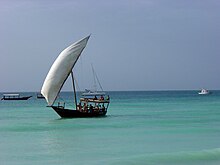dhow
Jump to navigation
Jump to search
English
[edit]
Etymology
[edit]Pronunciation
[edit]Noun
[edit]dhow (plural dhows)
- (nautical) A traditional sailing vessel used along the coasts of Arabia, East Africa, and the Indian Ocean, generally having a single mast and a lateen sail.
- 1886 October – 1887 January, H[enry] Rider Haggard, She: A History of Adventure, London: Longmans, Green, and Co., published 1887, →OCLC:
- I suppose I must have slept for seven or eight hours, getting the first real rest that I had had since the night before the loss of the dhow, for when I woke the sun was high in the heavens.
- 2001, David M Besaw, Joshua, Trafford Publishing, page 251:
- Joshua continued preparing breakfast, Bijan returned to piloting the dhow offshore and Pourghasem returned to his watch. […] Several dhows were on the water and some fishermen were already at work.
- 2003, Suzanne Miers, Slavery in the Twentieth Century: The Evolution of a Global Problem[1], Rowman & Littlefield (AltaMira), page 78:
- The navy sometimes hired dhows for its patrols. […] If a dhow was stopped, the slaves could not be counted on to make their presence known, having probably been told that the Europeans would kill them.
- 2011, J. W. Heldring, The Killing of Dr. Albrecht Roscher, Xlibris, page 109:
- They took a dhow from Mombasa bound for Aden and planned to take a larger vessel to Suez and then overland to Cairo.
- 2015, John P. Cooper, Dionisius A. Agius, Tom Collie, Faisal al-Naimi, “Boat and ship engravings at al-Zubārah, Qatar: the dāw exposed?”, in Proceedings of the Seminar for Arabian Studies[2], volume 45: Papers from the forty-eighth meeting of the Seminar for Arabian Studies held at the British Museum, London, 25 to 27 July 2014 (2015), →ISSN, pages 35–47:
- In contemporary Anglophone usage, the term ‘dhow’ has come to refer generically and exonymically to traditional wooden vessels of the western Indian Ocean, whatever their particular forms or emic classification.
Further reading
[edit]Anagrams
[edit]Categories:
- English terms derived from Arabic
- English 1-syllable words
- English terms with IPA pronunciation
- English terms with audio links
- Rhymes:English/aʊ
- Rhymes:English/aʊ/1 syllable
- English terms with homophones
- English lemmas
- English nouns
- English countable nouns
- en:Nautical
- English terms with quotations
- en:Watercraft